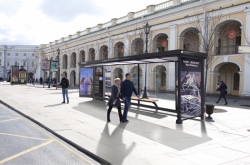What does the Russian Post have that other organizations don’t?
The Russian Post has a giant infrastructure that is spread out across the country - about 42 thousand offices, 140,000 postboxes and over 50 million mailboxes. What is more, it has a vast vehicle fleet: 14,000 cars and several thousand other vehicles. In fact, the Russian Post also employs a large number of people; over 100,000 of them are postmen and couriers, i.e. people who regularly make deliveries along a specific route.
How can this contribute to the smart city concept?
Most importantly, these resources can help gather data. For example, you can fix cars that make their everyday routes with sensors, so that they would gather data on the air’s chemical constitution, lighting level, noise pollution, traffic situation, surface irregularities, and much more. If you add a camera, you can register different events, accidents, for instance. A sensor on a postbox can register the number of pedestrians and cyclists who pass by, and the postbox itself can be fixed with a Wi-Fi hotspot and other useful stuff.
Russian Post staff members can also contribute to monitoring the urban environment. How can this be useful? Let’s say that a postman sees some malfunction in the city’s structure, a pothole, for instance. He or she photographs it and sends the data to the “Our Petersburg” webportal. When citizens send complaints, community services have to check them, i.e. come in person. The postman can be seen as a reliable source, so there will be no need to check the information they provide.

Who will benefit from using the Russian Post for gathering data?
In the first place, that would be the state. Maria Pavlovskaya gives a simple example. Today, they place luminance sensors on different sites of a city’s infrastructure in order to control the intensity of illumination. Still, part of the infrastructure can belong to private companies, which can considerably hinder the sensors’ work. Placing them on postboxes can be a great alternative: this way, the government won’t have to enter into additional agreements on renting the private companies’ equipment.
What is more, participating in the creation of a smart city infrastructure can be beneficial for the Russian Post, as well. For instance, the improvement of road pavement will decrease the cost of vehicle maintenance. Surely, that is a long-term investment, and the profits will become apparent in several years only, but now, modern governments learn to think ahead.
“Russian Post’s participation in innovative projects will raise the citizens’ loyalty to the organization, as it will have to modernize its business processes in order to take part in the development of smart cities, which, in turn, will improve the quality of postal services,” stresses the Master’s student.
Scenarios of Russian Post’s participation in smart city projects
There are two of them. The first is the most simple: the organization rents out its equipment so that sensors can be placed on it. In this case, there’s no need to make any changes to the staff’s schedule or business processes. In a more complex approach, the post’s personnel can also be involved in the project. The second scenario is when the Russian Post does not just gather the data, but stores and processes it, as well.

Is the Russian Post ready for innovations?
“I work at a department of the Russian Post that works on development of new products, among other things. This includes the improvement of the webportal and the mobile app, the opportunity to trace parcels by their tracking number, get fines and other notifications from governmental agencies in an electronic format, and more. In Moscow, for instance, there already is a service that allows you to bind your parcel to your cell phone number, so that you won’t have to enter your personal data to receive it. Soon, we’ll launch it in St. Petersburg, as well. A lot depends on the senior management, and I got very lucky - Evgeniy Dolgov, head of the department I work for, is open to innovation: he got interested in my ideas, he believes that they are viable, and he’s already taken part in the meeting of the “Smart St. Petersburg” project office where he talked to my research advisor Olga Kononova, associate professor at the Department of State Information Systems Management who really supports me in my research,” says Maria Pavlovskaya.
She adds that the Russian Post is constantly modernizing itself and is indeed open to innovations: currently, it is launching the Postal Technologies subsidiary that will focus on development of innovations and IT solutions for the enterprise, focusing on software development and management of logistics services. Also, much like other postal services all over the world, the Russian Post is turning its attention to the introduction of blockchain technologies.
Are the citizens ready for the new innovative Russian Post?
As part of her research, Maria conducted a survey among students and staff members of Russian universities, as well as employees of IT companies, governmental agencies and the Russian Post. The survey aimed to study the attitude towards the development of innovative activities in the organization, as well as find out whether the respondents see it as divergence from the postal service’s core activities. It’s no secret that the Russian Post’s work is often criticized, so won’t these additional activities hinder its operation even more? Still, it turned out that both the Russian Post clients and employees see the potential changes as a step towards making the enterprise's operation more efficient. Also, these people believe that the organization has the potential to develop innovations in order to become a dependable postal service provider for the country.

According to Maria Pavlovskaya, innovative development must be reciprocal. This means that the citizens also have to actively contribute to the improvement of postal services. At the Smart Cities Conference, they stressed the idea that you can’t build a smart city without smart citizens; this means that citizens have to participate in choosing the proper approach to organizing the urban environment, and the authorities have to consider their opinion.
With regard to the postal service, this means that you have to inspire citizens to offer possible solutions to solving particular problems, and not just complain about bad service. For instance, if you are dissatisfied with something particular in the operation of post offices, you should write to the corresponding department and offer your own perception of how it can be organized. On a higher level, it is possible to involve young professionals in solving Russian Post’s problems via different hackathons or workshops. Motivating the post’s employees to propose new ideas is a good idea, as well.
How did you get the idea to involve the Russian Post in developing the smart city concept?
“I got interested in how information systems in state management work, and wanted to learn more about it. So, I found the Department of State Information Systems Management, applied there, then got a job at the Russian Post. When I learned how vast the organization’s resources are, I started thinking of new ways to apply them. And this is how I came up with a project that is part of the smart city concept,” explains Maria.

Before entering a Master’s program at ITMO’s Department of State Information Systems Management, Maria Pavlovskaya completed a Bachelor’s program at the Faculty of Cybernetics and Information Security of National Research Nuclear University MEPhI. In Moscow, she worked for an international bank, where she focused on enterprise architecture.





